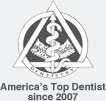What Causes Gum Recession?

The condition of receding gums, also known as gingival recession, occurs when the tooth roots are exposed by loss of gum tissue. It’s a common problem in people aged over 40 but it can afflict teens and children as young as 10. Gums protect the teeth by covering tooth roots, which also helps to secure your teeth in place in the jaw. When gums recede, it looks like they are disappearing, and your teeth start to appear more prominent and can become loose.
When gum recession occurs, gaps called “pockets” are created between the gum line and the teeth, and these are susceptible to build-ups of harmful bacteria. Without treatment, the soft tissue and bone supporting the teeth can sustain heavy damage, ultimately leading to tooth loss. Many people initially don’t realize they have receding gums because the condition develops gradually. When gum recession does become noticeable, the first indication is typically sensitivity of the teeth, or you may see that a tooth appears to be longer than normal or feel an indentation near the gum line.
Gum Recession and Periodontitis
Gum recession can be caused by many factors, but the most common is gum disease (periodontitis) – infection of the gums caused by an accumulation of bacteria-laden plaque and tartar on the surface of teeth near the gum line. More than half of the U.S. population over the age of 30 suffer from periodontitis, according to the Centers of Disease Control and Prevention (CDC).
The main causes of periodontitis-linked gum recession include inadequate oral hygiene, aggressive tooth brushing, a poor diet, smoking, and grinding teeth. Failure to brush, floss and use antibacterial mouthwash regularly leaves your mouth more susceptible to a build-up of tartar on and between your teeth. Tartar, also called calculus, is a hard substance that can only be removed by a professional dental cleaning.
Brushing your teeth too hard or using an incorrect technique can erode tooth enamel and cause your gums to recede. If your diet does not contain sufficient nutrients, your body’s natural defenses against infections including gum disease can become compromised. Consuming more dairy products and crunchy vegetables will help to avoid gum recession.
People who smoke are more likely to develop plaque on their teeth that can cause gum recession. Smoking also hinders the healing of inflamed gums. Grinding or clenching your teeth won’t cause periodontitis but it can aggravate the condition by exerting too much pressure on the teeth and cause the gums to recede.
Your dentist can advise you on how to brush your teeth properly, a healthy diet, and giving up smoking. Protection against teeth grinding can be afforded by mouthguards custom-made by a dental professional.
Other Causes of Gum Recession
Besides periodontitis, gum recession can also be caused by a misaligned bite or crooked teeth, and body piercing of the tongue or lips. According to WebMD, if your teeth do not come together evenly, excessive pressure can be placed on the bone and gums, causing gums to recede.
The health resource platform also says oral jewelry such as lip rings, tongue bolts and cheek studs can irritate the gums to the extent of wearing away tissue. If you’re considering having ornamental fixtures placed in your mouth, talk to a dental professional first. Because of the increased risk of dental or periodontal problems, you will probably need to have more frequent check-ups, and pay special attention to your oral hygiene.
A further reason you might get gum recession is in your genes. Hereditary, fragile gingival tissue will make you more prone to recession of the gums. Self-inflicted trauma is another cause of gum recession, mainly in young children. This may involve habits such as digging a pencil tip or fingernail into the gum. Women face a greater risk of receding gums because of hormonal fluctuations during puberty, pregnancy and menopause, which can make the gums more sensitive and more susceptible to recession.
Signs of Receding Gums
Bad breath (halitosis) or bleeding gums during brushing or flossing are both signs you could have receding gums, which may also be indicated by swollen, red or puffy gum tissue.
The state of your teeth can also provide a warning sign of gum recession, so watch out for these issues:
- Over-sensitive teeth. Dentin hypersensitivity – a sharp pain caused by hot or fold food and drinks – occurs when the underlying surface of a tooth (dentin) loses the protection afforded by the outer surface (enamel).
- Teeth appearing longer. A larger area of the tooth crown will be noticeable if your gums are receding.
- Spaces between teeth seem larger. The space is actually the same but appears greater because it’s no longer being filled by the gums.
- Cavities beneath the gum line. Tooth root decay at the gum line is associated with receding gums, gum disease, a dry mouth and smoking.
Getting Expert Help
Gum recession should never be ignored. If you suspect your gums are receding, make an appointment to see a dentist or periodontics specialist to repair the gum and halt further damage. In some cases, diagnosis and treatment of gum disease can reveal a gum recession issue that was previously masked by swelling of the gums.
If gum recession is detected during the early stages, treatment by a periodontic specialist can stop the problem from getting worse and help your gums to grow back. Mild gum recession may be treatable with deep cleaning – scaling and root planing ¬– to get rid of plaque and tartar that has built up on the teeth and root surfaces below the gum line. Antibiotics may also be prescribed to eliminate any remaining harmful bacteria. If gum recession involves substantial loss of bone, and pockets that are too deep, surgery may be needed to repair the damage.
One of the best ways to help prevent gum recession is to maintain a good routine of oral hygiene. Brush your teeth at least twice a day and floss daily to stop plaque and tartar taking hold and see your dentist or periodontist for regular check-ups. Concerned about gum recession? Contact us today to schedule an appointment and let us help you maintain good oral health and a winning smile!

 (425) 549-4649
(425) 549-4649









